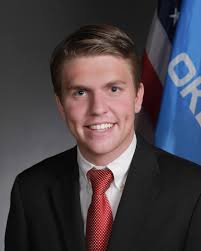Frix Studies impact of COLA on State Pension Plans
Mike Seals - November 9, 2020 9:58 pm

OKLAHOMA CITY – State Rep. Avery Frix, R-Muskogee, today hosted an interim study to examine the impact of last year’s cost-of-living adjustment (COLA) for retirees in Oklahoma pension plans.
The study was held before the House Banking, Financial Services and Pensions Committee. Members heard from executive directors of many of the state’s pension plans, including those for teachers, firefighters, police and other law enforcement and public employees.
“After twelve years, last year we were finally able to grant our state pensioners a cost-of-living adjustment,” Frix said. “Today’s study allowed us to look at impact of the COLA on Oklahoman’s public pension systems as well as the opportunity to discuss the potential impacts of granting future COLAs.”
House Bill 3350, authored by Frix, gave a 4% COLA to retirees with more than five years of service to the state and a 2% COLA to those with two to five years of service beginning July 1, 2020.
Benefit managers gave the following effects of the COLA on each pension system:
- Oklahoma Firefighters Pension and Retirement System (OFPRS): 1.1%;
- Oklahoma Law Enforcement Retirement System (OLERS): 0.4%;
- Oklahoma Police Pension Retirement System (OPPRS): 1.7%; this system still remains above 100% funded;
- Oklahoma Public Employees Retirement System (OPERS): 2%; and
- Oklahoma Teachers Retirement System (OTRS): 1.1%
These percentage numbers are only the drop in funding as it relates to the COLA. Some systems have dropped more than this amount, but those percentages are not related to the COLA.
Plan directors discussed other impacts to the systems as well.
Frix said he’s heard from many state retirees that the COLA granted last year was appreciated, but they still face rising costs of health care, insurance premiums and other living expenses. He said those concerns, of course, need to be balanced against the solvency of the plans and their funded status. Last year’s COLA represented a fiscally responsible agreement that kept the state’s pension plans on healthy financial footing, while helping retirees, he said.
Several pension directors said that 90% of the COLA and other retirement benefits remain in Oklahoma, contributing to the Oklahoma economy.
Frix also asked each pension plan manager to speak about the effect future COLAs might have on the upward trajectory of their plans’ funded status.
The committee also heard a financial status report of the retirement systems, the average retiree benefit amount and a discussion of payment outliers, and the economic impact of the 4% COLA for retirees across Oklahoma.
Joseph Fox, executive director of OPERS, discussed the differences between defined benefit and defined contribution plans.
Hank Kim, executive director of the National Conference on Public Employee Retirement Systems, spoke on what parameters other states use to grant COLAs.
Chase Rankin, executive director of OFPRS, and Chancen Flick, government relations with the Oklahoma Public Employees Association, discussed concepts for granting future COLAs, with Rankin detailing the Consumer Price Index Urban catch and Flick discussing future COLA parameters.



